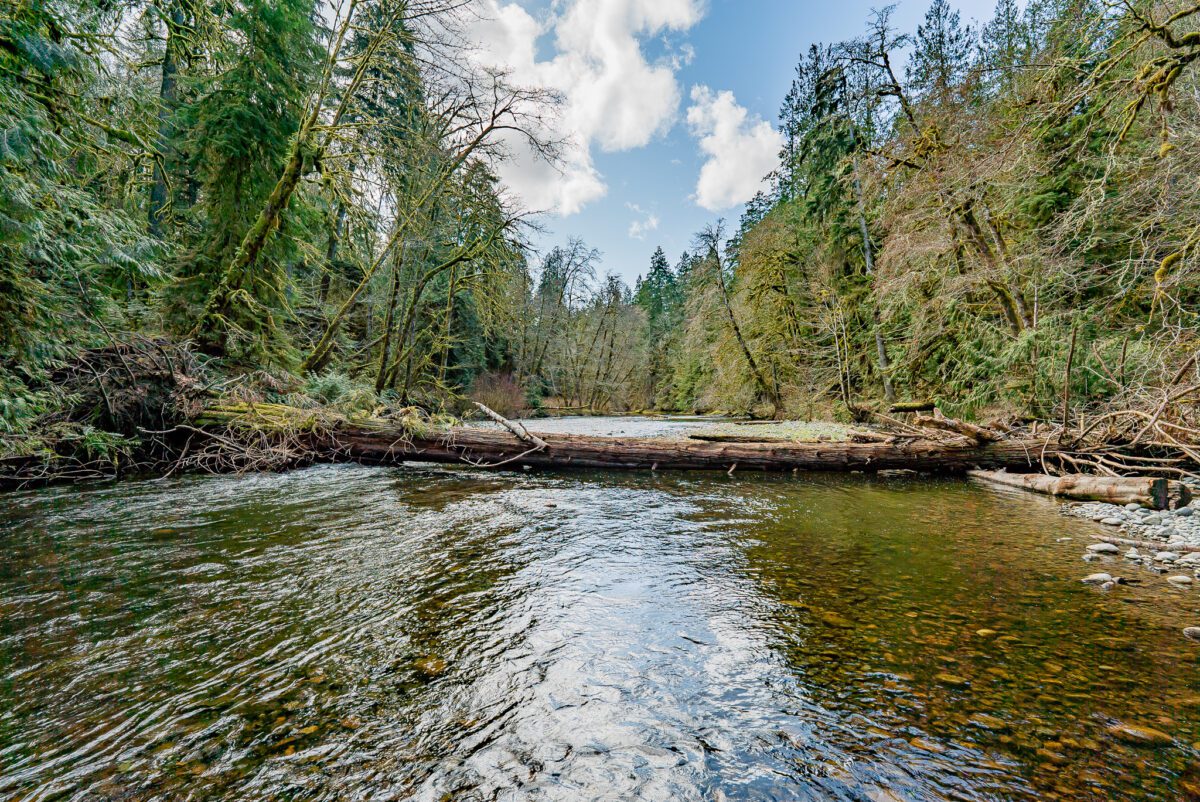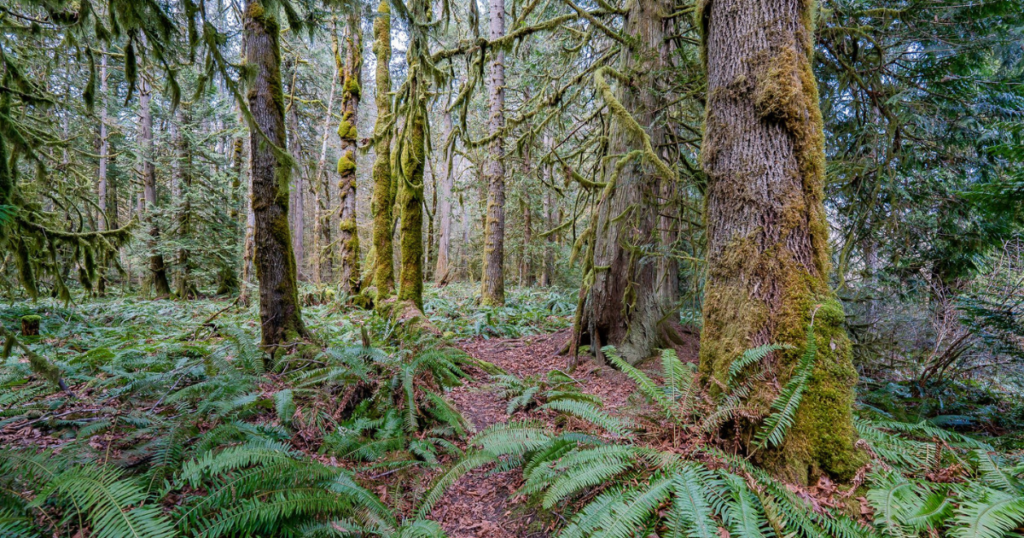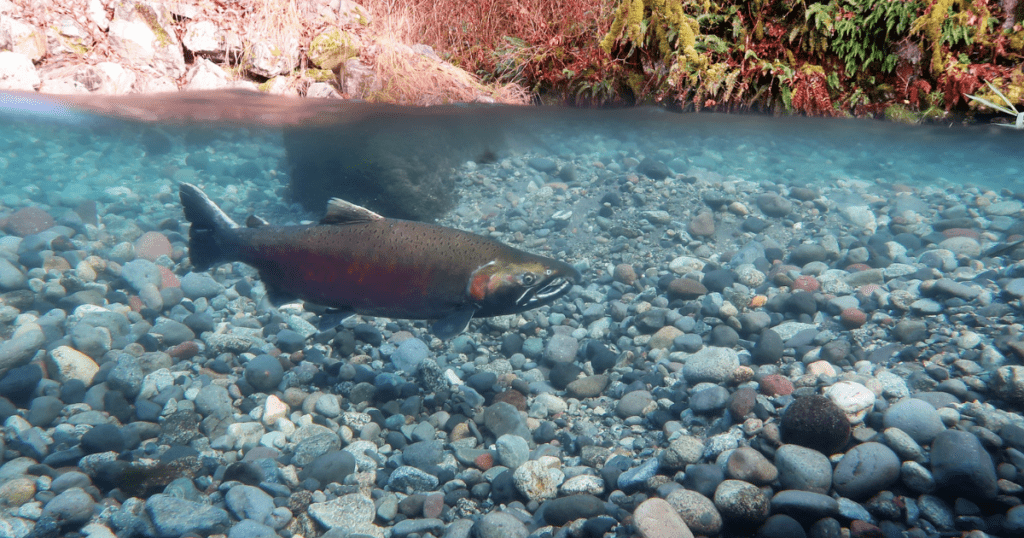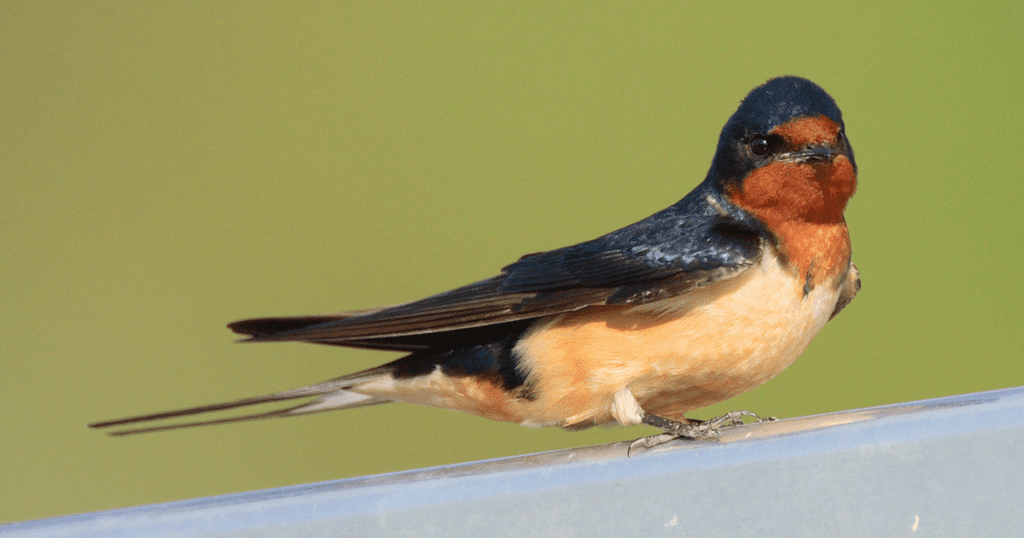
The Nature Trust of BC raises the funds needed to protect ecologically sensitive habitat and ecosystems from development.
May 9, 2023, Qualicum Beach, BC, Canada – Today, The Nature Trust of British Columbia, one of the province’s leading non-profit land conservation organizations, announces that it has successfully protected 15 hectares (36 acres) of ecologically important undeveloped land in the traditional territory of the Qualicum First Nation, along the Little Qualicum River on the mid-east coast of Vancouver Island.
Thanks to the generosity of donors and the support of the McBride family, and the Vancouver Island and Qualicum Beach communities, this property is The Nature Trust of BC’s first acquisition along this river.
“The McBride family, and our company Island Roots Forestry Services Ltd, are so pleased to have completed this process that we began five years ago to create this important conservation area on the Little Qualicum River. The conservation of this land could not have occurred without Mosaic Forest Management and The Nature Trust of BC sharing our vision to protect it. Our financial support for this effort will not end with this transfer to The Nature Trust of BC as we will continue supporting the ongoing maintenance of this ecologically significant land. We thank Mosaic Forest Management, as well as those many who have supported this initiative and continue to support The Nature Trust of BC’s important conservation projects.” said David McBride, The Nature Trust of BC partner and President of the Island Roots Forestry Services Ltd.

Forested area at the newly protected Little Qualicum River
The conservation area is located in one of BC’s most at-risk zones – the Coastal Douglas fir (CDF) moist maritime biogeoclimatic sub-zone. With only 11 percent of this zone protected in BC, the conservation of the Little Qualicum River marks an important step towards preserving this vulnerable ecosystems.
The Little Qualicum River is an important salmon spawning river, providing habitat for many salmon species, including Chinook, Chum, Steelhead, and Coho. Coastal Cutthroat trout are also plentiful within the river, which supports both Indigenous and recreational fisheries. A salmon hatchery is located upstream of this new conservation area.
“We are deeply grateful for the outpouring of support we have received to help us protect this beautiful and ecologically rich property. Conservation is a collaborative effort, and we could not protect these important ecosystems without donations from like-minded folks and the support of the McBride family. It’s thanks to them that Little Qualicum River, and the biodiversity within it, can thrive for generations to come.” said Dr. Jasper Lament, CEO of The Nature Trust of BC.

The salmon life cycle is essential to BC’s ecosystems and provides incredible environmental and ecological benefits. After salmon hatch, they eventually swim out to sea where they mature and gather nutrients from the ocean. Salmon then return to the rivers to spawn and die. As salmon decompose, insects and animals eat them and distribute the minerals and nutrients throughout the surrounding forests and riverine ecosystems. When animals drag salmon into the woods to feed, nitrogen is dispersed, which nourishes and fertilizes rare riparian plants and ecosystems. Hundreds of species, from insects and invertebrates to apex predators like bears, depend on salmon as a primary food source. The salmon life cycle stabilizes river banks and promotes lush forests and riparian ecosystems.
“It’s staggering to think of the impact that salmon have on these ecosystems. Salmon are key species that provide a vital service for BC’s ecosystems to thrive – it’s important that we never take them for granted. By conserving Little Qualicum River we can help to ensure that salmon and the other wildlife that depend on the river can continue to flourish.” said Dr. Jasper Lament, CEO of The Nature Trust of BC.
The Little Qualicum River is also an area of continental significance to waterfowl, including migratory and species of concern. It is home to at-risk birds such as the Surf Scoter, Purple Martin, Barn Swallow (Threatened under the Federal Species at Risk Act (SARA)), and Olive-sided Flycatcher (Threatened under SARA). The conservation area also provides habitat for at least three blue-listed (of special concern provincially) dragonflies, such as the Western Pondhawk, Blue Dasher, and the Autumn Meadowhawk, and Federally Endangered bats (under SARA) like the Little Brown Myotis and Northern Myotis.

The at-risk Barn swallow
The ecological benefits of the river have extended to the older forests surrounding it, with scattered veteran trees that have grown on this land for up to 250 years. These old-growth trees provide sanctuary for species and have tremendous carbon sequestration capabilities, acting as a natural solution for climate change.
The conservation of the Little Qualicum River tackles the twin crises of biodiversity loss and climate change, allowing wildlife and carbon-absorbing old-growth trees to flourish undisturbed for generations to come. The purchase of this vital salmon spawning river adds to the legacy of The Nature Trust of B.C. and demonstrates its unwavering commitment to protecting the vulnerable ecosystems and rich biodiversity in BC.
This project was undertaken with the financial support of the Government of Canada through the federal Department of Environment and Climate Change. Special thanks to Bob Sandy and Lisa Berlin for their generous gift to this project. This project would not have been possible without the absolutely inspiring support of the Qualicum Beach, Parksville, and Vancouver Island communities
About:
The Nature Trust of British Columbia is a leading non-profit land conservation organization with over 50 years of success protecting and caring for BC’s most critical habitats. Since 1971, The Nature Trust of BC and its partners have acquired more than 73,000 hectares (180,000 acres) of ecologically significant land to save vulnerable wildlife, fish and plants.
LEARN MORE:
Visit: www.naturetrust.bc.ca
Follow us on Twitter: @NatureTrustofBC
Become a fan on Facebook: www.facebook.com/NatureTrustofBC/
Follow us on Instagram: @NatureTrustBC
VIDEO AND IMAGES: here
CONTACT:
The Nature Trust of BC
Alicia Collyear, Account Director
604-558-1656
